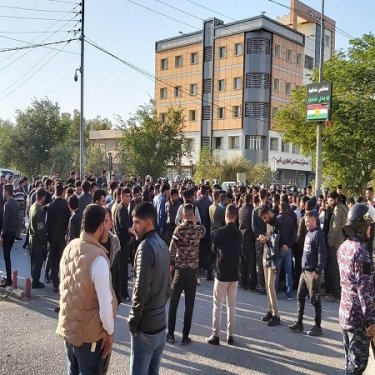Iraq : Wave of arrests of journalists covering protests in Iraqi Kurdistan

Reporters Without Borders (RSF) condemns a wave of press freedom violations in northern Iraq’s autonomous Kurdistan Region, where at least 10 journalists have been arrested while covering peaceful protests during the past week, one has been placed in pre-trial detention and a regional TV channel, NRT TV, has again been banned. Detained journalists must be freed at once, RSF said.
Covering anti-government protests is becoming increasingly difficult in Iraqi Kurdistan. The latest victims have included Harem Majed, a reporter for the Bazianpress website, who was arrested in Bazian, a town in Soulaymaniyah province, on 9 December while covering a peaceful protest against the high unemployment level and Kurdish political party corruption.
Karzan Tariq and Goran Mohammed, who work for the regional satellite TV channels NRT TV and Payam TV, and two journalists with the national TV channel Al-Iraqiya, reporter Amin Ahmed and cameraman Sirwan Barzan, were held for 24 hours after being arrested on 11 December in the city of Soulaymaniyah, where they were covering protests.
After being arrested while covering protests in Kalar, in Soulaymaniyah province, for Radio Deng on 12 December, Mohammed Mahmod was placed in detention and was threatened with reprisals if he did not abandon his journalistic work.
Rojnews TV reporter Zosk Ballak has been held ever since his arrest on 12 December in Choman, in Erbil province, in connection with two articles he wrote about the recent protests.
Rudaw TV reporter Bakhtyar Kader was covering a protest started by young Iraqis in Ranya, in the northeast of Soulaymaniyah province, on 11 December, when he was attacked by a member of a unit of the Kurdish security forces, known as the Peshmerga, that had been sent to keep an eye on the area.
Three journalists working for Kurdistan24 TV, Dalia Kamal, Hardy Hassan and Barham Jamal, were also briefly arrested on 13 December while interviewing passers-by about their economic situation and difficulties in the current fraught context in Soulaymaniyah.
“Arresting journalists will prevent economic demands from voiced in the region,” said Sabrina Bennoui, the head of RSF’s Middle East desk. “It is essential to allow the population to have access to all the information that is important to them. The Kurdish security forces must stop obstructing the work of journalists and must immediately release those still being held.”
For the third time in recent months, the authorities meanwhile banned NRT TV from broadcasting for a week on 7 December, after security forces stormed into its Soulaymaniyah headquarters and ransacked equipment. NRT TV is run by Shaswar Abdulwahid, who founded the New Generation Movement, an opposition party, in January 2018. Three other TV channels, Payam TV, Speda TV and Rudaw TV, have also been the targets of threats designed to deter them from continuing to cover the protests.
The protests against Iraqi Kurdistan’s autonomous government and main political parties, which erupted in early December in Soulaymaniyah province, have been accompanied by outbreaks of violence and have been dispersed by riot police. Many journalists were arrested during an earlier, major wave of protests in Iraqi Kurdistan in August.
Iraq is ranked 162nd out of 180 countries in RSF's 2020 World Press Freedom Index.



